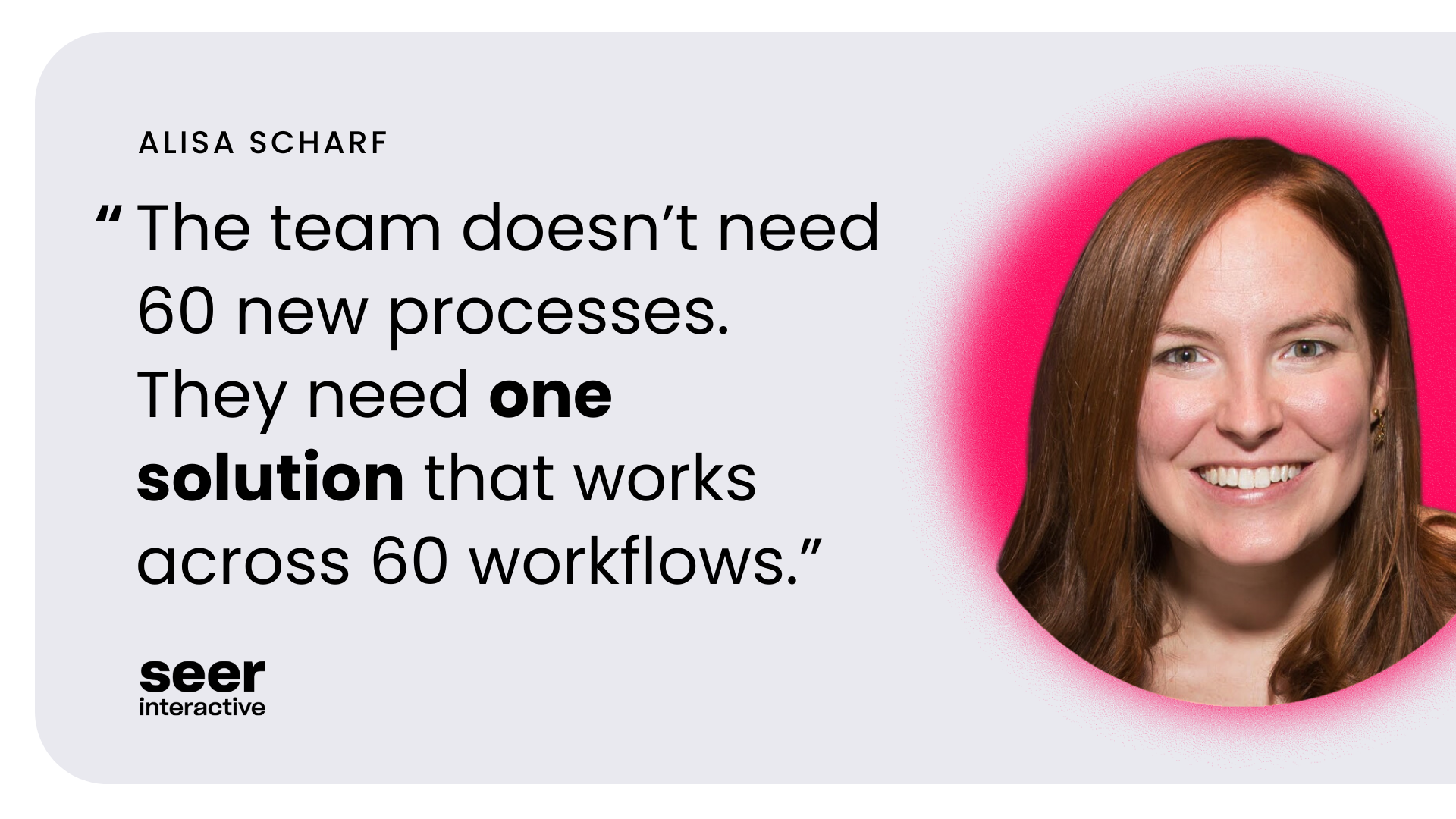To be a better Project Manager, I rely on Seer’s project brief template. Not only is it a grounding document to fill out, but it undoubtedly improves our team’s workflow.
A project brief allows Project Managers to come prepared to meetings with all of the information their teams need. Or, at the very least, a plan to get all of the info needed for our teams to be successful.
Keep reading for tips on process & fact-finding or click here to skip right to our project brief template.
The Value of Fact-Finding
Regardless of project type, there’s one thing that all new deliverables have in common: the need for fact-finding.
As a Project Manager, my job is to ask questions. I don’t necessarily need to be an expert in a deliverable’s subject matter (though it doesn’t hurt), but rather, need to be an expert in identifying missing information as well as assessing liabilities and risk factors in requests before sharing them with my team.
When receiving a new request, whether it’s from a client or an internal ask, it’s to forego fact-finding and jump right into execution. I may have a decent understanding of the request, a loose timeline, and the drive to problem-solve along the way, but nine times out of ten, I’ll end up sinking more time into a project than needed due to problem solving along the way versus asking questions up front and gathering all requirements prior to execution.
There’s definitely a time and place for building the ship while you fly it, but that isn’t sustainable year over year across all of the projects we touch.

What’s Needed for Project Kickoff?
If you’re putting together ad creatives for a paid social campaign, you may know the goal of the project is to increase your brand awareness, but do you know how many assets are needed for the campaign, or what file sizes and types they need to be? These are the key details practitioners need to be successful.
Whenever you get a new request, regardless of the project’s urgency, guardrails, or seemingly straightforward nature, take a beat to review the request. Read every word in the brief or email that was sent to you. Then ask yourself, if I was executing on this request, would I have enough info to successfully complete the project?
If yes: You can slot this into your team’s resourcing, setup timelines appropriately, and share out the full project brief.
If no: Take 15 minutes to compile a list of follow-up questions. Now it’s time to ask yourself, Am I sharing these questions in a way that this person can respond to, to allow me to do my job effectively?
Rather than asking, “Can you fill out the project brief sections that were left blank?” rephrase your question to be more specific:
- Example: “For us to deliver on [X], we will need to understand [Y requirement] better. Could you provide additional context in [Z section]?”
Breaking Down the Project Brief
Overview
What relevant context does someone need to complete this project? Why is it important? Detail any relevant historical information and where the project ask came from.
- Example: Create 4 ad sets to market Client’s new service that launches on X date. Client is aiming to have this campaign live one week before launch. Ads will run across Facebook/Instagram, LinkedIn, and Pinterest.
Goals
Your business objective or goals should always be measurable and time-bound. What is the desired outcome of the project, and why is it important? The project goal is the anchor for the work that needs to be done.
- Example: Increase service awareness and generate a 3% increase in site traffic to X page within two months from launch.
Audience
Who is the output of this for, and how does it relate to the project’s goals? Again, be specific and share as many audience demographics as possible (age, gender, geographical location, marketing funnel stage, etc.)
- Example: These ads will target current Client users who may be unaware of this new service. These users are aged 25-34 and reside mainly on the East Coast. Ads will be awareness & interest-focused.
Output
What needs to be created for the project to be successful and completed? Provide exact details around what the final deliverable will be. Share any associated notes, creative examples, and design direction.
- Example: Four ad sets that contain three unique animated ad concepts each using the provided Client-approved ad copy. Animated ads should be 5-7 seconds long, in MP4 format under 4GB and come in two sizes each (1080x1080px & 1920x1080px) for a total of 24 assets.
Timeline
When does this work need to be accomplished by, and what are the interim milestones? Outline any internal or Client review periods, design timelines, and meeting checkpoints.
- Example: Week of [#/#]: Review brief & begin design for all 4 ad sets.
Next Steps
Are there any actionable steps that need to be taken after the project is complete?
- Example: After launch on [X date], monitor performance for 2 weeks and prep a presentation deck for the Client to discuss campaign performance.
RACI Matrix
You’re so close to completing a robust and actionable project brief!
The RACI (Responsible, Accountable, Consulted & Informed) is where you align on who is actually doing the work, who is required to review the work, who will provide input, and who needs to be looped in on general project process.
It’s key that everyone in the RACI is given a heads up on their role in the project and gives signoff on the project brief. Learn more about the RACI process.
- Example: Responsible: Designer, Accountable: Creative Manager, Consulted: Paid Media Manager, Informed: Project Manager

Pinterest Ads created for Latham Pools with the help of a Project Brief
Your Turn!
A task might seem pretty clear-cut and straightforward, but filling out a project brief shows what you know and what you don’t know, but need, to accomplish a task. Evaluate the info you have, what info you still need, and establish a plan to get it.
Project Brief Template
If you’re receiving a request that isn’t already in project brief format, pull from your organization’s pre-existing brief template or leverage Seer’s project brief template to identify the context around the ask, who’s involved, and what the timeline is.
Looking for dedicated Creative & Design support?
Check out Seer's capabilities, work samples, etc. and get in touch:





